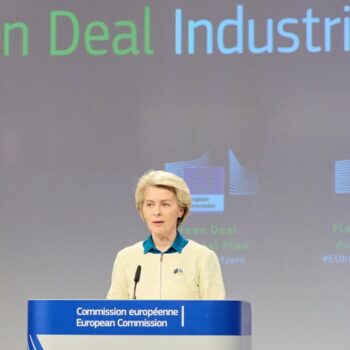Today, the European Commission, Parliament and Council have made progress on three important files for the EU’s climate transition, respectively.
- The European Commission tabled a proposal to reform Europe’s electricity market that would scale up renewables, demand response and storage while empowering consumers.
- The European Parliament approved an ambitious position on the reform of the Energy Performance of Buildings Directive, supporting the inclusion of mandatory Minimum Energy Performance Standards for the whole building sector.
- Ministers of economy and finance gave their green light for the Commission to issue concrete legislative proposals for the revision of EU fiscal rules.
Story
EU’s Electricity Market Design
- The European Commission tabled today the proposals to change electricity market rules amid pressure from capitals to address the impact of gas prices on electricity consumers. The Commission chose to focus the reform on speeding up renewables and reducing price volatility, while deferring more structural assessments until the next Commission.
- The proposal puts renewable energy at the heart of future electricity markets. It focuses on providing more predictability for investors and consumers through new provisions for long-term markets and enhanced consumer protection. It includes critical provisions to support a move towards a highly renewable electricity grid including requirements for member states to assess system flexibility needs and set national objectives for demand-side response and storage. This is a vital and much-needed step to secure a low-cost, resilient and decarbonised energy system.
- It is now up to member states and the European Parliament to refine the proposal, with a final agreement expected as early as the end of 2023. Further steps should be taken to enhance demand-side response provisions and encourage grid operators to take advantage of digitalisation to support the expected boom in the deployment of EVs and heat pumps.
EU’s Energy Performance of Buildings Directive
- The European Parliament has adopted its position on the revision of the Energy Performance of Buildings Directive (EPBD) in today’s plenary session, backing the Commission’s proposal to introduce mandatory Minimum Energy Performance Standards (MEPS) for the whole building sector.
- This new instrument will provide clarity on the pace and sequencing of the full decarbonisation of the building stock, allowing investors and industry to scale up and plan accordingly. The Parliament’s vision for the EPBD has the potential to eradicate leaky buildings, and increase the efficiency of the European energy system, while increasing energy resilience and improving the quality of life of the most vulnerable.
- This vote signals the EU could tap into the potential of energy savings and social justice in the building stock, which represents 40% of Europe’s energy use. However, the Council’s internal fragmentation and divergence with the Parliament’s vision on MEPS could result in laborious negotiations and hinder the final adoption of MEPS as the central piece of Europe’s buildings renovation.
EU’s Economic Governance and fiscal rules
- Ministers of economy and finance agreed at today’s ECOFIN Council meeting to support the Commission’s general direction on the revision of EU fiscal rules, calling on the Commission to issue legislative proposals. The ECOFIN agreement points to country-specific debt reduction pathways and more flexibility in response to multiple crises.
- The general direction laid out by the economy and finance ministers does not reflect the huge transitional investment needs that EU member states face. Fiscal space for green investment remains constrained, and even when it comes to determining the future degree of debt reduction flexibility, important details are yet to be determined.
- The timing is crucial, as the current crisis-related suspension of budgetary rules for member states is set to end next year, while Member States face the triple challenge of navigating through ongoing crises, maintaining competitiveness, and implementing the green transition. The Commission will present a legislative proposal in a few weeks (likely in April), which will allow the next phase of discussions to continue, with an aim to agree on a revision by the end of the year.
Quotes
Vilislava Ivanova, E3G Research Manager, clean energy systems, said on the revision of the EU’s Electricity Market Design:
“The Commission plans to tackle high prices from gas power generation in the best way – by reducing its significance. Flexibility targets and system readiness plans are necessary tools to reduce gas use, but not sufficient. More action will be needed, especially by network operators, to ensure the EU takes advantage of 21st-century digital technologies and promotes consumer-focused innovation”
Adeline Rochet, E3G Senior Policy Advisor, buildings decarbonisation, said on the Energy Performance of Buildings Directive:
“The EPBD has the potential to permanently reduce energy bills, improve the quality of the building stock, and increase Europe’s energy resilience, while slashing emissions. EU member states didn’t show much ambition so far, but they can still show leadership by supporting the European Parliament’s call for a clear and robust pathway to decarbonise all of EU buildings by 2050”
Taube Van Melkebeke, E3G Policy Advisor, EU climate governance, said on the Economic Governance & fiscal rules:
“EU member states have finally agreed on the need for a revised fiscal framework. As the Commission’s proposal maintains the EU’s strict fiscal reference values, the revamped rules should introduce other incentives and flexibilities that allow investments in a socially fair green transition. Both the Commission and the ECOFIN ministers recognise the need, but the current proposal doesn’t unlock the necessary space for investments to deliver this transition”
– ENDS –
Available for comment
- Vilislava Ivanova (EN, BG, DE), Research Manager, Electricity Market Design. +32 (0) 497 499 243. vilislava.ivanova@e3g.org
- Adeline Rochet (EN, FR), Senior Policy Advisor, Energy Performance of Buildings Directive. +32 (0)470 11 85 80. adeline.rochet@e3g.org
- Taube Van Melkebeke (EN, NL, FR), Policy Advisor, EU Politics and Climate Governance. +32 (0)472818429. taube.vanmelkebeke@e3g.org
Notes to Editors
- E3G is an independent climate change think tank with a global outlook. We work on the frontier of the climate landscape, tackling the barriers and advancing the solutions to a safe climate. Our goal is to translate climate politics, economics and policies into action. About – E3G
- For further enquiries email press@e3g.org or phone +44 (0)7783 787 863


